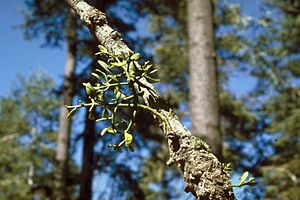Fir mistletoe facts for kids
Quick facts for kids Fir mistletoe |
|
|---|---|
 |
|
| fir mistletoe growing on a fir branch | |
| Scientific classification | |
| Genus: |
Phoradendron
|
| Species: |
pauciflorum
|
Phoradendron pauciflorum, often called fir mistletoe, is a type of flowering plant. It belongs to the sandalwood family. You can find this plant growing naturally in coniferous forests in places like California, Arizona, and Baja California.
Contents
Fir Mistletoe: A Plant That Borrows
Fir mistletoe is a special kind of plant. It's known as a parasitic plant. This means it lives on another plant, called a "host," to get what it needs.
How Fir Mistletoe Lives
The fir mistletoe's only known host tree is the white fir (Abies concolor). It attaches itself to the white fir tree. From its host, the mistletoe takes water and important nutrients.
Even though it borrows from the fir tree, fir mistletoe is also a hemiparasite. This means it has some chlorophyll. Chlorophyll is the green stuff in plants that helps them make their own food using sunlight. So, fir mistletoe can do some photosynthesis too! It makes some of its own energy.
What Does Fir Mistletoe Look Like?
Fir mistletoe grows as a shrub. It has many green branches that stand upright. These branches can grow to be more than half a meter (about 20 inches) long.
Along its stems, you'll see small leaves. They grow in pairs, opposite each other. These leaves are shaped like wide spear tips and can be up to 2.5 centimeters (about 1 inch) long.
Flowers and Berries
Fir mistletoe plants are dioecious. This is a fancy word meaning there are separate male and female plants. The male plants produce one type of flower, and the female plants produce another.
If you find a female fir mistletoe plant, you might see its flowers turn into small, round berries. These berries are usually yellowish to light pink. Each berry is about 4 millimeters (less than half an inch) wide.

